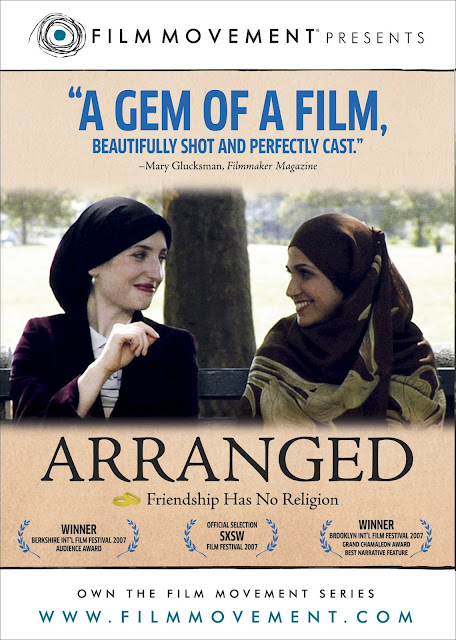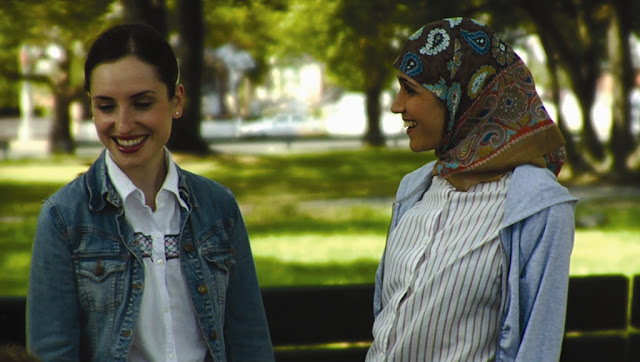Zoe Lister-Jones is Rochel, a twenty-two year-old Jewish woman from New York, just beginning her new job as a special education teacher at a public school. Francis Benhamou is Nasira, an independent young Muslim woman also beginning her career teaching the fourth grade at the same school. Because of their shared students and more conservative beliefs, the two women become friends and help each other through their prospective arranged marriages. Both women are at a crossroads in their lives as they try to please their families and maintain their faith, while also seeking their own happiness.
As a quick side note, Schaefar and Crespo did an astounding job of placing the film within a religious setting and really giving the film a deep center in tradition and devout faith. During the opening credits, the film establishes itself within these religious neighborhoods in such a way that for the first five minutes I didn’t realize the movie was set in the United States until a character specifically stated it.
 |
| Original movie posted for ‘Arranged’ |
Similarly, the film is mostly women and mainly centers on the interactions among mothers and daughters, sisters and friends and the ways that they struggle to understand one another through the lenses of their own experience. I found the mother-daughter relationship between Rochel and Nasira and their mothers to be especially poignant. Rochel’s mother, Sheli (Mimi Lieber), and Nasira’s mother, Amina (Gina Schmuckler), are both incredibly sympathetic to their daughters, obviously wanting what’s best for them—Sheli is even willing to support Rochel in her decision to wait, against the judgments of the matchmaker and neighborhood women; however, they’re also dynamic forces in their daughters’ lives, fighting and pushing them to a decision they think is best. It’s simultaneously both frustrating and heartening to watch but also very realistic in how it captured many female, familial relationships.
Arranged is very focused on proving that modern ideals of love and dating are not always best and obviously wants to show that many women in these same situations are independent and beloved by their families, while also having a choice in who they marry. Unfortunately, the film does end up undercutting its own intentions to show that these women have a choice, but should they make the choice not to marry or choose someone other than a person their family approves of, it’s stated that Rochel (and probably Nasira) would have to leave their families and would ultimately be disowned.
 |
| Zoe Lister-Jones and Francis Benhamou in Arranged |
Ideas about arranged marriages in the United States vary, from deeply traditional communities still using matchmakers and choosing for their children, to critics, both in and outside of these communities, who say that choices are still limited for women and believe that arranged marriages have similar levels of distress and unhappiness. No one knows the exact amount of marriages in the U.S. that are arranged (or forced for that matter), but researchers believe the number of arranged marriages globally to be around fifty percent.
The film attempts to show that love can build and grow from an arranged marriage since it belies the transience of infatuation, but by the end of the film, it feels like a too-convenient tying up of loose ends. I had hoped to see more exploration in one or two of the couples learning to love each other, or perhaps one of the women making the choice to wait or not to marry. It would have been productive to see how two very good actresses and their devout and intelligent characters would have dealt with such a situation.
It was also unfortunate that three of the four secular characters in the film were caricatures of western insensitivity, and it is sad to think that many intelligent and good people of faith, especially of more orthodox religions, have to deal with such harsh judgment (I’m guilty as well, I confess). But, the other characters seemed to be painted with a quick brush that was pretty heavy on the “airhead.” None of these characters was very informed or particularly smart, a glaring group of character flaws that need some more subtlety and diversity. The female principal of their school (Marcia Jean Kurtz) is especially inappropriate and condescending in the way that she speaks to Rochel and Nasira about their religions (in a way that I think no public school principal in New York City could act and still keep her job).
It’s interesting since this film was made over fifty years ago, but The Fiddler on The Roof is still more of a hard-hitting exploration in tradition vs. modernity, arranged marriage vs. choice, religion vs. race than Arranged.
Yet, all in all, Arranged is a sweet and uplifting film about the power of female friendship with great actresses, a beautiful score, and a uniquely positive portrayal of women. I would definitely recommend this film for a Sunday afternoon.
Rachel Redfern has an MA in English literature, where she conducted research on modern American literature and film and its intersection; however, she spends most of her time watching HBO shows, traveling, and blogging and reading about feminism.
